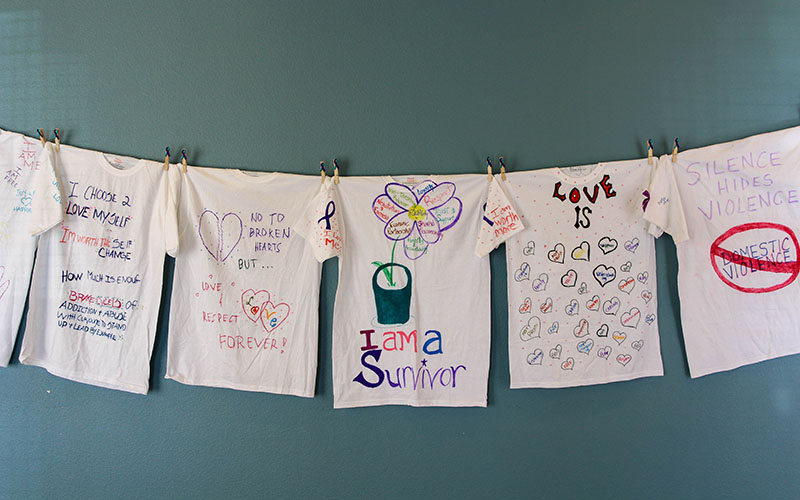
T-shirts made by domestic violence victims are displayed at the 5th Annual Domestic Violence Symposium in Phoenix. (Photo by Andrea Jaramillo Valencia/Cronkite News)
PHOENIX – Shantelle Satchel was 17 years old when she met the man who would change her life forever back in Milwaukee. Two years later, he shot her in the face because he saw her getting out of a car with two men.
“I still have a bullet in my mandible. It caused nerve damage. God saved me to stand in front of you to tell you I survived,” Satchel said.
In a room full of mostly women dressed in purple, the color chosen to represent domestic violence awareness, survivors and organizations gathered to talk about the issue during the 5th Annual Domestic Violence Symposium hosted by South Phoenix Healthy Start.
According to the Arizona Coalition to End Sexual and Domestic Violence, one in every four women in Arizona has experienced domestic violence, compared with one in every seven men. Just last year, the Arizona Department of Economic Security reported 28,546 calls related to domestic violence, while 7,428 adults and children received shelter.
But experts said those numbers may actually be higher because there’s a lot of shame and fear, leading to unreported cases.
Dorian Townsend, executive director of Community Alliance Against Family Abuse in Arizona, said undocumented women face a double whammy when it comes to reporting domestic violence: the added fear of being deported.
“There is a hesitation to contact 911 in a crisis situation. There’s sometimes a fear of being deported and so that fear ends up being a further barrier on top of just the fears that they are encountering in their own home,” Townsend said.
Townsend said the fear of reporting domestic violence, or any crime, depends on the political climate of the moment. She said she’s heard many women say they were afraid of speaking out since the current administration took office.
“There’s definitely being added fears expressed by some of our participants,” Townsend said. “Escaping violence, they worry that that may be the triggering moment.”
Some of the work that the alliance does is helping undocumented immigrants that are victims of domestic violence to apply for a United States visa.
It would be a special kind of visa for victims of certain crimes, including domestic violence, sexual assault and kidnapping.
Another group CAAFA helping is the one made up of Eastern European women who were victims of sex trafficking.
“Some of them met American men online, they had a relationship online, came to the U.S., married those men and then they wound up being either trafficked or they were essentially isolated to the house and were sexually assaulted multiple times,” Townsend said.
She said the greater Phoenix area is in the top 20 cities in the nation for sex trafficking.
Sarabeth Spencer, a training specialist with the Sojourner Center, talked about some of the psychological and social factors that explain why a victim stays in an abusive relationship.
Spencer said, on average, it takes a victim seven times before deciding to leave their partner. She mentioned barriers such as not having enough shelters available, feeling responsible for keeping the family together when there are children involved or hoping for a better future in which their partner will change.
Another factor is the difference in cultures, Spencer said.
She said in some cultures, divorce is stigmatized and victims feel pressured into staying in their marriage for fear of social criticism.
Spencer also said financial abuse is another form of domestic violence, one that is less visible but that still affects many women.
Dana Burns, who introduced the panelists during the event, said she was touched by the stories of domestic violence as a survivor herself, and was grateful she was able to find the resources she needed to get out of her abusive relationship.
“Nobody is gonna mess with me now,” she said.